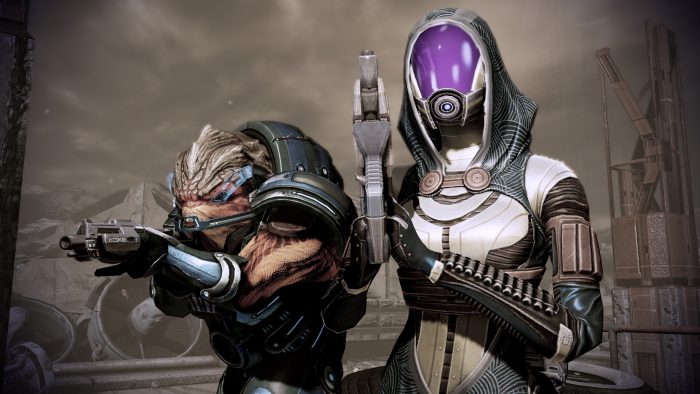One thing I knew right away when I was asked which game had the best ensemble of characters, my answer was the Mass Effect series. However, there was a problem for me: I couldn’t pick the series as a whole. I had to narrow down which game from the series had the better characters. Was I a bigger fan of the most badass Krogan in the series on my team in the first Mass Effect, everyone’s favourite Salarian scientist in Mass Effect 2, or the wisecracking AI in Mass Effect 3? In the end, I decided to go with Mass Effect 2. Not only do you have a large team at your disposal to help you deal with a variety of situations, the circumstances of your suicide mission is a natural catalyst to bring you and your squadmates together. Mass Effect 2 is also the only game in which it is entirely possible to save or lose your entire team based on Commander Shepard’s relationships with his/her crew members.
The big thing that makes Mass Effect 2 stand out is each crew member’s loyalty missions. For the final mission, your chance of survival is higher if you have completed each of your squad’s personal missions. If you don’t complete the loyalty missions for your squad, there’s a high chance of them dying during the mission. It’s in your best interest to do them to ensure your own survival, as well. You’re not a one-man army, and you need your squadmates to come out of the final mission intact.
…the excellent cast of Mass Effect is what helped make the series one of my favourite franchises from the last generation.
You shouldn’t do their loyalty missions simply for the final battle, though. Loyalty missions give you a chance to get to know the characters better. If you take the time to speak with your squadmates between missions, each tells you a part of their past: family, friends, and unfinished business. Each of them has something they would like to do before they potentially go to die on the suicide mission your team was given, and fulfilling their goals will leave them free to focus on the task at hand.

These missions are obviously very personal to your squadmates, and this also gives you the chance to have an influence on their behavior for the rest of the series. Garrus, for example, can become a big softie, or someone who focuses only on his task at hand even if it’s unethical. You can choose to spare the person he wants to kill and show Garrus the path of forgiveness, or let him kill this person to avenge his old squadmates. This is true for just about anyone, and those who reappear in Mass Effect 3 remember the choices you helped them make.
The myriad relationships that your crew has with each other is another intriguing aspect of the series. While I believe the first Mass Effect did this better, there was a lot more variety in Mass Effect 2‘s characters. Jack and Miranda become rivals as each were bred to be the very best in their fields; Mordin and Grunt discuss the ethics of the Salarians’ sterilization of the Krogan race; and Tali learns to overcome her hatred of the Geth in order to work with Legion. Taking specific characters along for a mission results in some great banter between them that makes the experience all the more enjoyable.
Even the miscellaneous crew members on the Normandy are fun to talk with. Characters like Joker, Dr. Chakwas, and Engineer Adams have their own backgrounds and interesting quirks that make your time on the Normandy more than just a break period between missions. The Normandy is a ship filled to the brim with people to talk to, and there’s plenty of interesting conversations to have with everyone during your downtime.
Mass Effect 2 boasted a large cast of characters, each with their own distinct personalities. The series as a whole gets you to invest a lot of time into its cast of characters and it succeeds. I often say that a story is nothing if I don’t care for its cast of characters, and the excellent cast of Mass Effect is what helped make the series one of my favourite franchises from the last generation.



